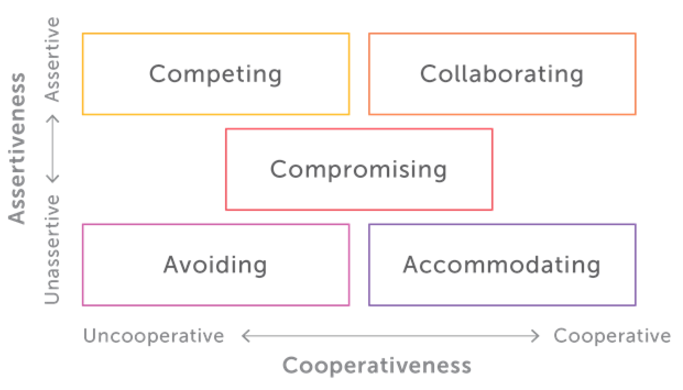THOMAS-KILMANN CONFLICT MODE (TKI®) ASSESSMENT
CONFLICT MANAGEMENT – ESSENTIAL TO ORGANIZATIONAL PERFORMANCE

Organizations are made up of employees who differ in personal characteristics and experience. To be effective as an organization, those members must reach agreements on goals, make good decisions about how to achieve those goals, and help each other accomplish their activities – despite their differences. Being able to reconcile differences and to handle conflict constructively is a key determinant of organizational performance.
The Thomas-Kilmann Conflict Mode Instrument (TKI®) is the leading measure of conflict-handling modes. One of the reasons for the Thomas-Kilmann’s popularity is that it shows how each conflict mode can be useful for dealing with conflict in certain situations. The TKI® allows people to appreciate the value of their own conflict styles and also learn the value of other styles as well. Using the Thomas-Kilmann assessment allows people to focus and build on their strengths.
THE TKI® HAS PROVEN TO BE EXTREMELY HELPFUL IN TEAM BUILDING
The Thomans-Kilmann Conflict Mode Instrument is widely used for helping both new and established teams at all organizational levels – from front line staff to senior management teams. It is also used across a wide variety of private and public sector organizations.
Using the TKI® assessment with new teams helps members get acquainted with each other’s conflict styles, identify potential challenges, and set goals for how they should handle conflict as a group.
With established teams, the Thomas-Kilmann helps team members make sense of the different conflict behaviors that have been occurring within the team, identify the team’s challenges in managing conflict, and find constructive ways to handle those challenges.
WHAT ARE THE CONFLICT-HANDLING MODES ASSESSED BY THE TKI® TOOL?
The Thomas-Kilmann describes five different conflict modes and places them on two dimensions:
Assertiveness – the degree to which a person tries to satisfy their own concerns
Cooperativeness – the degree to which a person tries to satisfy other people’s concerns.
THE FIVE MODES:
Competing
- Assertive and Uncooperative
- You try to satisfy your own concerns at your teammate’s expense.
Collaborating
- Assertive and Cooperative
- You try to find a win-win solution that completely satisfies both your concerns and your teammate’s concerns.
Compromising
- Intermediate in both Assertiveness and Cooperativeness
- You try to find an acceptable settlement that only partially satisfies your concerns and those of your teammate.
Avoiding
- Unassertive and Uncooperative
- This is seen as the withdrawal from or refusal to address the conflict.
Accommodating
- Unassertive and Cooperative
- The result is the submission of one party by acknowledging and accepting another’s side of the issue.
Contact David D. Krull
Prior Lake, MN, 55372
M-F: By Appointment
Sat: By Appointment
Sun: Closed
Prior Lake, MN, 55372
M-F: By Appointment
Sat: By Appointment
Sun: Closed
